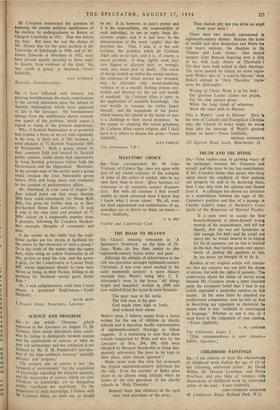SCIENCE AND PROGRESS
SIR.—In the article ' Dilemma ' _svhich appeared in the Spectator on August 13, Sir Carleton Allen surely introduces some confu- sion by failing to distinguish between science and the applications of science, or what we may call technology; and the confusion is not lessened by Mr. 0, M. Popplewill's introduc- tion of the false antithesis between ' scientific advance ' and ' progress.'
The primary aim of science is not ' the conquest of environment' but the acquisition of knowledge regarding the material universe; and the discoveries of science, which are con- tributions .to knowledge, are in themselves neither beneficent nor maleficent. To the acquisition of such knowledge, I believe with Sir Carleton Allen, no limit can or should be set. It is, however, in man's power and it is his responsibility, the responsibility of each individual, to use or apply these dis- coveries aright; and it is just here, in the interpretation of the word ' aright,' that the problem lies. That, I take it, is the sole problem, the problem which Sir Carleton Alien asks us to face, and it is, of course, a moral problem. A drug, rightly used, may cure disease or alleviate pain; or, wrongly used, may cause pain or death. The stores of energy locked up within the atomic nucleus, the existence of which science has revealed, may be liberated with world-shattering violence or as a steadily flowing stream con- trolled and directed for the use and benefit of mankind. Sir Carleton Allen is right; in the application of scientific knowledge, ' the real worlds to conquer lie within [man] himself,' and the magnitude of the power which science has placed in the hands of men is a challenge to their moral greatness. As the means of attaining this moral greatness, Sir Carleton Allen rejects religion, and I shall leave it to others to discuss this point.—Yours faithfully,
7'he Athenaeum. S.W.I ALEX FINDLAY


































 Previous page
Previous page